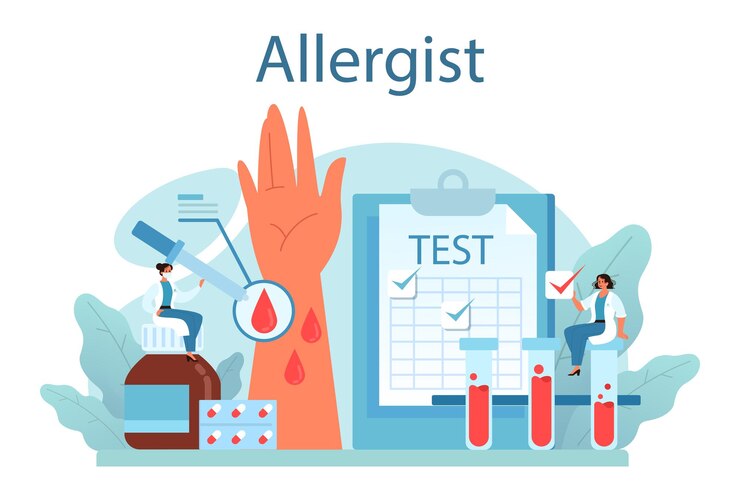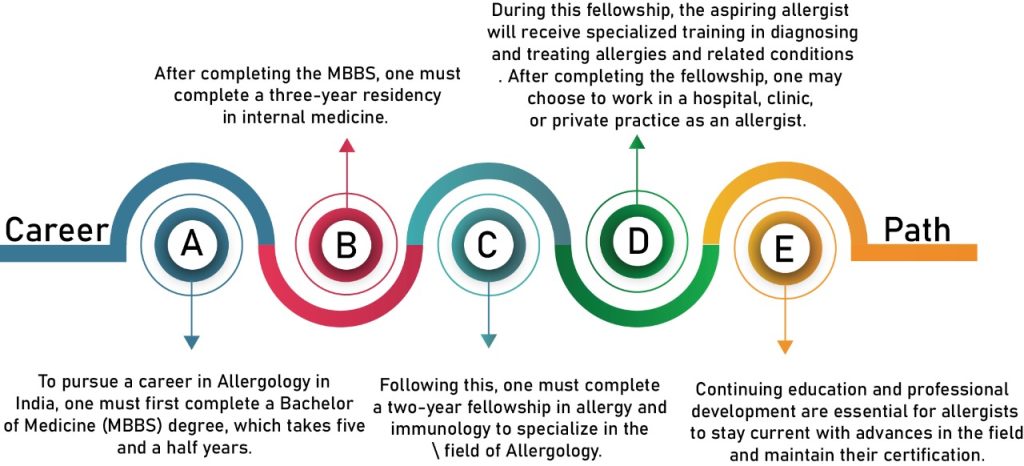Allergology is the medical specialty that focuses on the diagnosis and treatment of allergies and related conditions. Allergies are a result of the body’s immune system overreacting to substances that are harmless to most people, such as pollen, dust mites, or certain foods. Allergists specialize in identifying the specific allergens that trigger an individual’s allergic reactions and developing treatment plans to help manage or alleviate their symptoms. Treatment options may include medications, allergy shots, and lifestyle changes. Allergology also involves educating patients on how to avoid allergens and manage their condition effectively.

Work description
An allergist, also known as an immunologist, is a medical professional who specializes in diagnosing and treating allergies, asthma, and other immune system disorders.
Their work description typically involves conducting patient consultations to gather information about their medical history, symptoms, and potential allergens.
They may also perform skin tests, blood tests, or other diagnostic tests to determine the specific allergen causing the patient’s reaction. Based on their diagnosis, allergist develop treatment plans tailored to each patient’s individual needs, which may involve prescribing medications, immunotherapy, or making lifestyle modifications to avoid allergens.
Allergist also play an important role in educating patients on how to manage their condition and prevent future allergic reactions.
High Demand
High demand for allergists due to the increasing prevalence of allergies and related conditions.
Lucrative salaries
Competitive salary and job stability.
Opportunities for innovation
Opportunity to improve the quality of life for patients by providing effective treatment and management of allergies.
Versatility
Ability to work in a variety of settings, including hospitals, clinics, and private practices.
Flexibility
Opportunities for research and academic positions.
Job satisfaction
The potential to specialize in areas such as sustainable design, structural engineering, or building systems design.
High stress
Extensive education and training required, including medical school and residency.
Long hours
Long hours and demanding work schedule, including on-call duties.
Competitive field
Exposure to allergens may pose health risks for the allergist.
Constant learning
High level of responsibility and pressure to make accurate diagnoses and develop effective treatment plans.
Isolation
May encounter difficult or uncooperative patients, which can be emotionally challenging.
Eye strain and other physical health issues
The potential for competition for jobs, particularly in areas with high demand for architectural engineering services.
The cost of pursuing a career in Allergology in India can vary depending on the individual’s educational background, location, and other factors. To become an allergist, one must first complete a Bachelor of Medicine and Bachelor of Surgery (MBBS) degree, which typically takes five and a half years and can cost anywhere from INR 5-20 lakhs in tuition fees alone depending on the college.
After completing their MBBS, aspiring allergists must undergo a three-year residency in internal medicine, which can cost an additional INR 5-10 lakhs.
Finally, to specialize in Allergology, one must complete a two-year fellowship program, which can cost anywhere from INR 5-15 lakhs in tuition fees. Overall, the cost of pursuing a career in Allergology in India can range from INR 15-45 lakhs in tuition fees alone, depending on the college, not including additional expenses such as books, equipment, and living expenses.
[wpcharts type=”horizontalbarchart” bgcolor=”red:gray:yellow,blue:gray:yellow,random:gray:yellow,purple:gray:yellow” min=”0″ legend=”true” titles=”2 year , 5 year” values=”3,7,5,12″]
The earning potential of an Allergology in India can vary depending on factors such as location, experience, and type of employer. The average annual salary for an allergist in India is around INR 5-20 lakhs, with entry-level salaries starting around INR 500,000 and experienced professionals earning up to INR 20 lakhs or more. Allergists working in private practice or as consultants may have higher earning potential than those working in hospitals or clinics. In addition, allergists who specialize in certain areas, such as pediatric allergies or food allergies, may have higher earning potential due to the high demand for their expertise. Overall, the earning potential for Allergist in India is considered to be competitive and can provide a comfortable standard of living.
[wpcharts type=”horizontalbarchart” bgcolor=”red:gray:yellow,blue:gray:yellow,random:gray:yellow,purple:gray:yellow” min=”0″ legend=”false” titles=”Entry-Level, Mid-Career, Senior-Level ” values=”5,15,25,35,45,55″]
Strong interest in and aptitude for medical sciences and biology.
Good communication skills to effectively interact with patients and colleagues.
Strong attention to detail to make accurate diagnoses and treatment plans.
Patience and empathy to work with patients who may be experiencing discomfort or anxiety.
Ability to work well in a team environment, collaborate with others, and provide leadership when necessary.
Commitment to lifelong learning and staying up-to-date with the latest developments in the field.
Ability to work well under pressure and make critical decisions in a timely manner.
Allergies or sensitivities to common allergens may limit exposure to patients and pose a health risk.
Inability to handle stress and pressure may lead to burnout or mistakes in patient care.
Poor communication skills may result in misunderstandings or ineffective treatment plans.
Lack of attention to detail may lead to incorrect diagnoses or treatment plans.
Lack of empathy may make it difficult to provide effective patient care and establish trust with patients.
An inability to handle stress and pressure, which can be high in roles that involve managing complex projects or tight deadlines.
A lack of attention to detail, which can lead to errors and safety issues in designs.
Work-life balance
The work-life balance of an allergist can vary depending on factors such as their employment setting, patient load, and individual preferences.
In general, allergists who work in hospital or clinic settings may have more structured schedules, while those in private practice may have more flexibility to set their own hours.
However, allergists may still work long hours, including early mornings, evenings, and weekends, to accommodate patient needs. On-call duties may also be required in some settings.
Balancing patient care with personal time and self-care is essential to maintain a healthy work-life balance. Allergists may also benefit from networking and support from professional organizations and colleagues in the field. With proper time management and self-care strategies, allergists can achieve a fulfilling career while also maintaining a healthy work-life balance.

Allergology as a career can have a significant impact on the lives of patients, helping them to manage and overcome allergies and related conditions.
Allergists can help patients identify triggers and develop effective treatment plans to improve their quality of life.
Allergists can work in a variety of settings, including hospitals, clinics, and private practices, providing opportunities to make an impact in different communities and populations.
Pursuing a career in Allergology can be financially rewarding, with competitive salaries and opportunities for growth and advancement.
Allergology is a field that offers a high level of job satisfaction, as allergists can see the tangible impact of their work on their patients’ lives.
Architectural engineers can contribute to disaster resilience by designing buildings and infrastructure that are resilient to natural disasters such as earthquakes, floods, and hurricanes.
Pediatric Allergology
It focuses on allergies and related conditions that affect children, including food allergies, eczema, and asthma.
Allergy and immunology
Specializes in the diagnosis and treatment of allergies, asthma, and immune system disorders, such as immunodeficiency and autoimmune diseases.
Food Allergology
Focuses on the diagnosis and treatment of food allergies and related conditions, such as eosinophilic esophagitis and celiac disease.
Dermatological Allergology
It specializes in the diagnosis and treatment of allergic skin conditions, such as hives and eczema.
Environmental Allergology
It focuses on allergies and related conditions caused by exposure to environmental allergens, such as pollen, dust mites, and mold.
Conclusion:
In conclusion, Allergology offers a rewarding and challenging career path for those interested in medical science, helping patients manage and overcome allergies and related conditions. With various specializations available, Allergology provides opportunities to work in different settings and make a positive impact on different communities and populations. Pursuing a career in Allergology requires a strong interest in medical sciences, empathy, and good communication skills. Although it can be a demanding field, Allergology offers a high level of job satisfaction, financial reward, and opportunities for growth and advancement.



